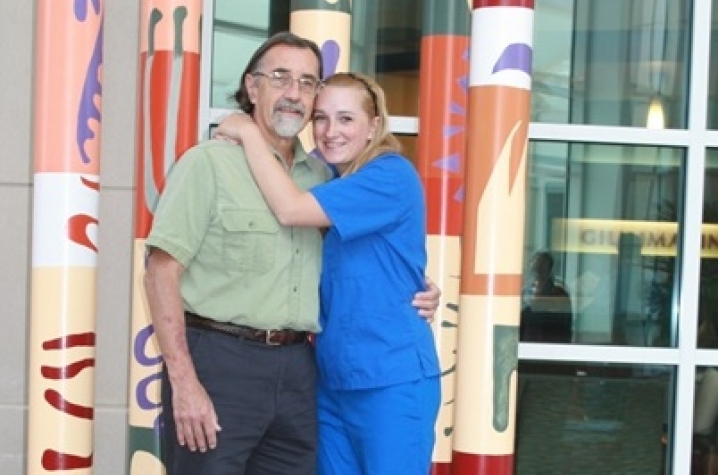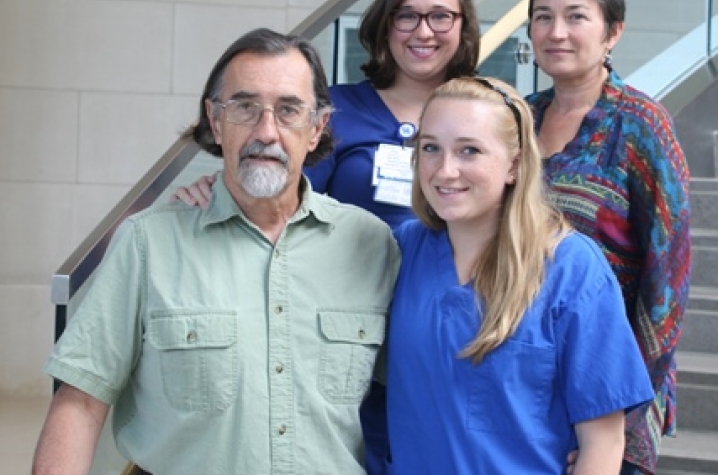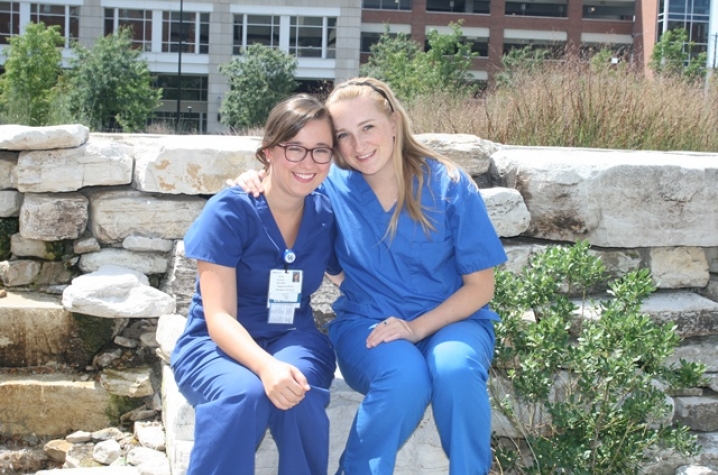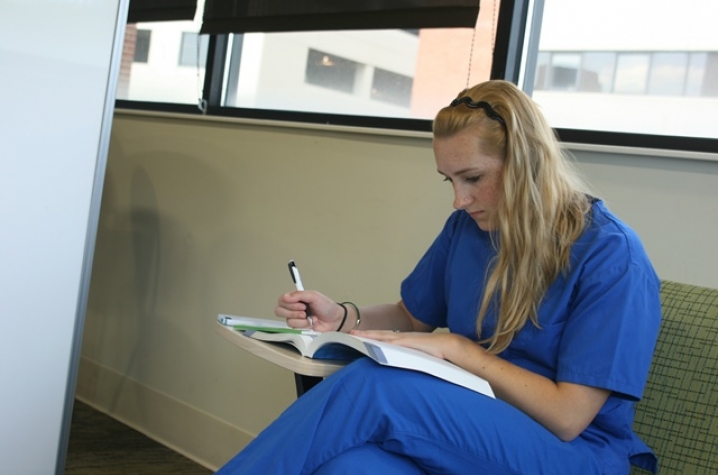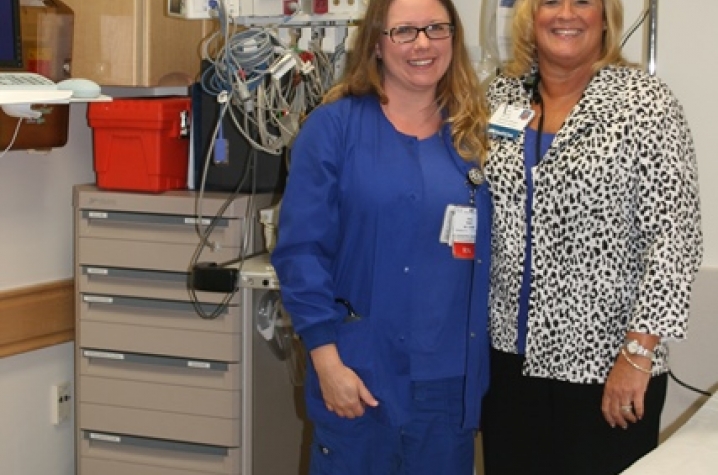UK Nursing Student's First Experience With Trauma Was Life-Saving for Her Father
LEXINGTON, Ky. (Sept. 19, 2013) − Anna Kraemer, a 20-year-old second semester nursing student at the University of Kentucky College of Nursing, thought briefly about reviewing the steps to CPR on her smart phone, but there was no time as she dragged the unconscious body out of the car onto the pavement outside the UK Emergency Department (ED) and began CPR.
She never expected her first experience with trauma to happen so soon outside the controlled environment of the classroom. Time stood still even though help came quickly. She watched the chest rise and fall as members of UK's ED arrived to take over and wheel her father inside.
Tuesday, June 4, 2013, started out as an ordinary day. Anna, who says her father, Philipp Kraemer, the Chellgren Chair for Undergraduate Excellence at UK, never shows concern for himself. However, on this day he kept coming into the house from his woodworking shed complaining of indigestion and saying his arms felt 'funny.' He had chest pains but thought it was because he had worked out too hard with weights the day before. Her dad seemed very anxious and he asked Anna to take his vitals. By now, Anna started to sense the urgency and looked up his symptoms on the internet. The information kept pointing to one thing: heart attack.
The Kraemers live close to UK Chandler Hospital, so Anna decided to drive her dad to the ED. However, as she was backing out of the driveway, he started gasping for air. Too panicked to drive at this point, Anna saw her neighbor John Reynolds, who immediately jumped into the driver's seat as they raced to the ED.
The 911 operator called ahead and alerted them a hear attack victim was on the way. The ED team immediately went into action by setting up an exam bay and paging Cardiology to be on stand-by.
Anna's mother, Beth Kraemer, who is director of Digital Library Services at UK, arrived at the hospital within minutes after a call from Anna.
Beth Kraemer said that despite the flurry of activity in the emergency department, everything seemed well orchestrated and the nurses and doctors provided extraordinary care.
"Every person in the ED has an integral role - nurses, physicians, paramedics, techs, and clerks," Patricia Howard, operations manager of Emergency Services at UK Chandler Hospital said. "We want every patient to have a good outcome"
Sixty-two year-old Philipp Kraemer could best be described as the picture of health. He rides a bike to his office on UK's campus every day, is physically active, and generally healthy. Anna said she didn't think something like this could happen to someone like her dad.
However, Philipp Kraemer said that although he has no memory of the day of his heart attack or immediately after, in retrospect, he can remember feeling drained after exercising and attributed it to the fact that he is no longer in his 20s.
Coronary heart disease (CHD) is the leading cause of death in the U.S. and although mortality rates have declined over the past four decades, it remains responsible for about one-third of all deaths in individuals over age 35.
"Heart disease can happen to anybody," said Dr. Melina Aguinaga-Meza, assistant professor of Medicine, cardiologist and intensivist at UK's Gill Heart Institute, who led the cardiology team that took care of Kraemer during his hospital stay and now his primary cardiologist.
Aguinaga-Meza says he had a 90 percent blockage in the main artery which provides blood to the heart. A stent was placed to clear the blockage but there was still some concern over what damage to the brain may have occurred because of the amount of time it took at get his heart beating again.
She also explains that the longer a heart is stopped, the greater the chance for brain death. Studies show that if you cool the brain down after a trauma, neurons are cooled and don't work as much which means less cell death. Therapeutic Hypothermia, a relatively new treatment that has been used at UK’s Gill Heart Institute for the past few years, has shown great success in improving neurologic outcome and reduced mortality.
Philipp Kraemer's body was cooled to a targeted temperature of 32 - 34 Celsius degrees and gradually warmed up 24 hours later.
"Anna was a rock during this whole experience," Beth Kraemer said. "She talked with Phil while he was unconscious, joking with him and patting his arm. Even the nurses and technicians talked with him: 'I need to draw blood now. You're going to feel a stick,' which was in some ways comforting to me."
Anna's older sister, Emily, a 22-year-old May 2013 graduate of the UK College of Nursing, was in Italy at the time of her father's heart attack but made it home a few days later. Coincidentally, Emily recently started her first nursing job in the UK ED as a trauma nurse.
"He has had a remarkable recovery," Aguinaga-Meza said. "He will be on medications for the rest of his life -- aspirin, beta blockers, statins, and ace inhibitors -- but the fact that he recovered so quickly makes his prognosis good.”
Philipp Kraemer said he has a new perspective of UK HealthCare.
"It's always been a big operation with no personal connection to me," he said. "The care I received and the nurses were remarkable. It's a real testament to what modern medicine, technology, and resources can do."
"I'm lucky I had my daughter there who handled this," Philipp Kraemer said. "I'm very proud of both my daughters for going into the nursing profession."
Emily Kraemer said her dad's heart attack has given her new insight into trauma nursing and will help her as she cares for patients and families dealing with trauma.
The Kraemers are very grateful for the compassionate care they received at UK for what they describe as a miraculous recovery by Philip. "This is a story of survival," Beth Kraemer said. "We all feel very lucky."
Media Contact: Ann Blackford at 859-323-6442 or ann.blackford@uky.edu





